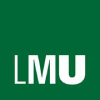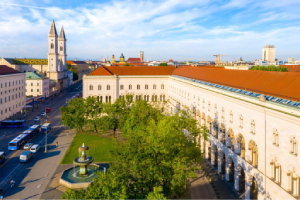Geschwister-Scholl-Platz 1, D-80539 München, Germany
Career Counselling

Ludwig-Maximilians-Universität München is one of the oldest Universities in Germany. Located in Munich, it was established in 1472, and is today home to more than 52,000 students, with almost 20% of them coming from outside the country. It has always been one of the highest ranked institutions of higher education in Germany, and its research work in medicine, in particular, has been recognized worldwide.
Academic and Research activities at LMU Munich are divided into 18 Faculties, which fall into five broad categories: Religious Studi...
| Establishment year | 1472 |
| Total Students | 52,418 |
| International Students | 10,255 |
| QS World University Rankings 2024 | 54 |
| Campus Size | N/A |
| Total Number of Campuses | 4 |
| University Website | https://www.lmu.de/en/ |
| No. of Schools and Divisions | 18 Faculties |
| Nobel Prize Winner Alumni | 14 |
| No. of Education Programs | 103 (undergraduate), 113 (postgraduate) |
| Student to Faculty ratio | 7.9:1 |
LMU Munich offers undergraduate and postgraduate courses through 18 Faculties, which are further subdivided into Departments, Schools, Institutes, and Centers.
Two Faculties provide UG and PG taught and research programs in Religious Studies:
Five Faculties conduct undergraduate and postgraduate programs in various fields of Science:
Six Faculties teach UG and PG courses, and carries out research within Humanities and Liberal Arts:
Two Faculties provide UG and PG taught and research programs in Medical Sciences:
Three Faculties conduct undergraduate and postgraduate programs related to Business Administration:
International applicants to Bachelor’s programs at LMU must hold a valid high school examination certificate. However, depending on the country of origin of the applicant, he or she might have to attend a one year preparatory course at the University. The details of the criteria for secondary education for each country can be found on the DAAD website.
International applicants to Master’s programs at LMU Munich must have completed a Bachelor’s degree in a relevant discipline. Graduate programs have many more requirements than undergraduate programs; candidates should carefully check individual course webpages to make sure that they are eligible. Certain programs may require a research background, professional experience, a creative portfolio, or a series of interviews. Doctoral programs require applicants to have completed a postgraduate degree from a recognized institution, along with a research proposal and a potential supervisor.
All courses (UG and PG) have language proficiency requirements. Most programs at LMU Munich are taught in German, and B2 or C1 proficiency in the language is required for most courses, with individual requirements listed on course webpages. In case an applicant cannot meet this language proficiency level, he or she should contact the University to check the possibility of enrolling in language classes prior to joining a full time degree program. Applicants who have been asked to join the preparatory program must already have B2 level proficiency in German. In case the candidate is applying to a course where the medium of instruction is English, TOEFL, IELTS, or Cambridge scores can be submitted, if the applicant is from a country where the native language is not English.
Overseas students must submit their applications to the International Office of LMU Munich by post; there is no provision for online applications. There are two components to the application: a detailed form (where details of academic history, performance, and personal particulars must be entered) and a set of documents, including:
Applications must be submitted before 15 January, for the summer semester, or 15 July, for the winter semester. LMU sends a physical letter of admission or notification of rejection to the residential address given in the application form. This communication usually arrives within one month of the application package reaching the University.
The final two steps of the admission process take place after the student arrives in Munich, and involve enrolling at LMU through the International Office, and obtaining a long term residence permit within three months of arrival, after paying the associated fee of 110 Euros.
Since 2013, LMU has not charged tuition fees. This exemption is applicable to both domestic and international students. Some highly specialized postgraduate and professional courses may have additional fees; details can be found on the program webpages.
The only fees to be paid are the basic fee (which covers the cost of Student Union membership and administrative expenses; paid every semester) and the semester ticket fee (paid towards the use of student facilities; paid once a year). The total amount to be paid is 237.30 Euros annually.
The University estimates that living costs add up to 900 Euros per month, on average. This is reflected in the requirements for the residence permit: international students must show that they have access to at least 10,332 Euros per year. Accommodation costs do not exceed 650 Euros per month, even in private apartments, and the monthly rent is 400 Euros on average in low cost University housing. The monthly health insurance contribution is 80 Euros, and food costs rarely exceed 300 Euros per month. Other minor heads of expenditure include phone and internet, transportation, and personal shopping; the total of these is approximately 100 Euros per month.

LMU Munich has four campus locations spread throughout the city of Munich. The Geschwister Scholl Platz Campus is the oldest location; located near the city center, it is still home to most of the University’s Faculties. Campus Sendlinger Tor hosts the medical and biosciences academic and research facilities, with close proximity to the University Hospital. Grosshadern / Martinsried contains specialized research units, with the Campus Oberschleissheim, on the outskirts of the city, housing the Veterinary Research Faculty.
Munich is a vibrant city, with over 100,000 students ensuring that there are always cultural and sports activities happening every week. LMU has 40+ student groups that assist in bringing together members of the University community who are interested in sports, art, entertainment, and social work. There are regular orientations organized for first year students; these allow them to settle in quickly.

The Munich University Sports Center has facilities to allow students to take part in over 90 different sports and physical activities. From rock climbing to skiing, aerobics to yoga, and sailing to basketball, LMU does its best to ensure that its students and staff stay healthy and active. The membership of the Sports Center is priced very affordably, with an entire semester’s card costing just 7.50 Euros.
The Student Union runs the Culture Bureau, which organizes dances, drama training and screening events, Oktoberfest promotions, student festivals, music symphony evenings, and art talks. Membership in this organization is free, and they also host journalism groups and trips to historic sites within the city.
The SIST LMU Study Scholarship is awarded to international students at any level of study. This is unique in that the application process starts after the student has already been enrolled at LMU for two semesters. Based on financial need and two letters of reference, the University decides a variable scholarship amount at its discretion. This cannot be combined with any other internal or external scholarship.
The main Government Scholarship for students at LMU (both domestic and international) is the Deutschland Stipendium. This is awarded based on academic potential and other factors, like social welfare work. Awardees receive a monthly stipend of 300 Euros for a year. This covers roughly a third of the monthly living costs. There is no limit on the number of students who can apply for or receive this scholarship.
There are also several emergency scholarships. For example, LMU Nothilfe is a program set up by the Bavarian State Government through which international students can access short term financial assistance of up to 650 Euros. This is a one time payment.
The SIST LMU Study Completion scholarship is a semester-long financial assistance program that is open to all international and domestic doctoral students at LMU. The amount is typically higher than that of the Study Scholarship, and selection is strictly on the basis of academic excellence. All students who exceed the minimum threshold are eligible to be awarded this scholarship, with no maximum number.
